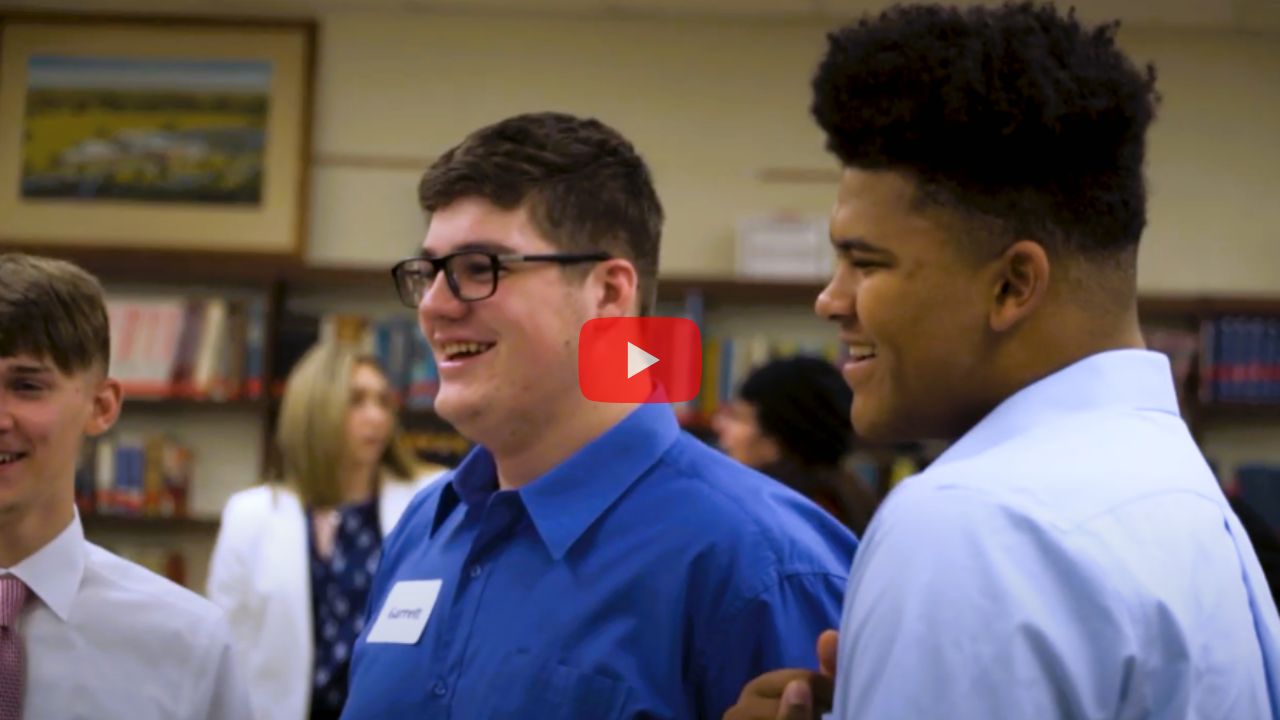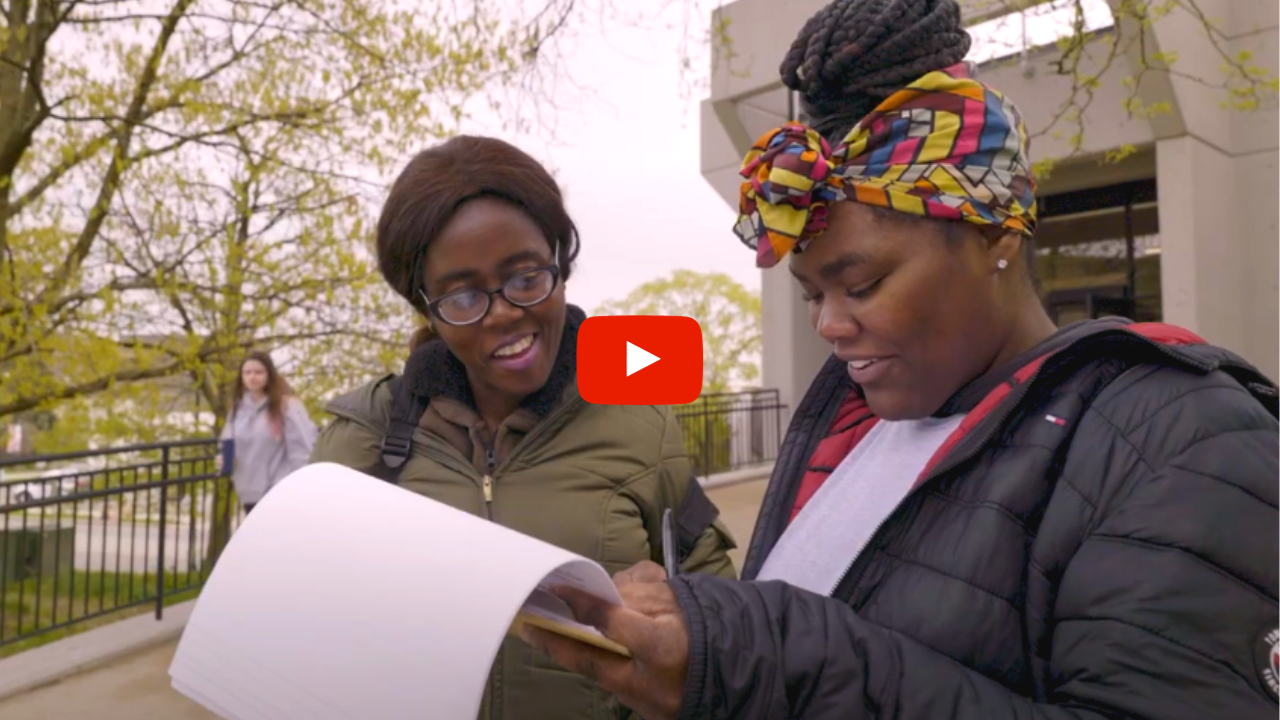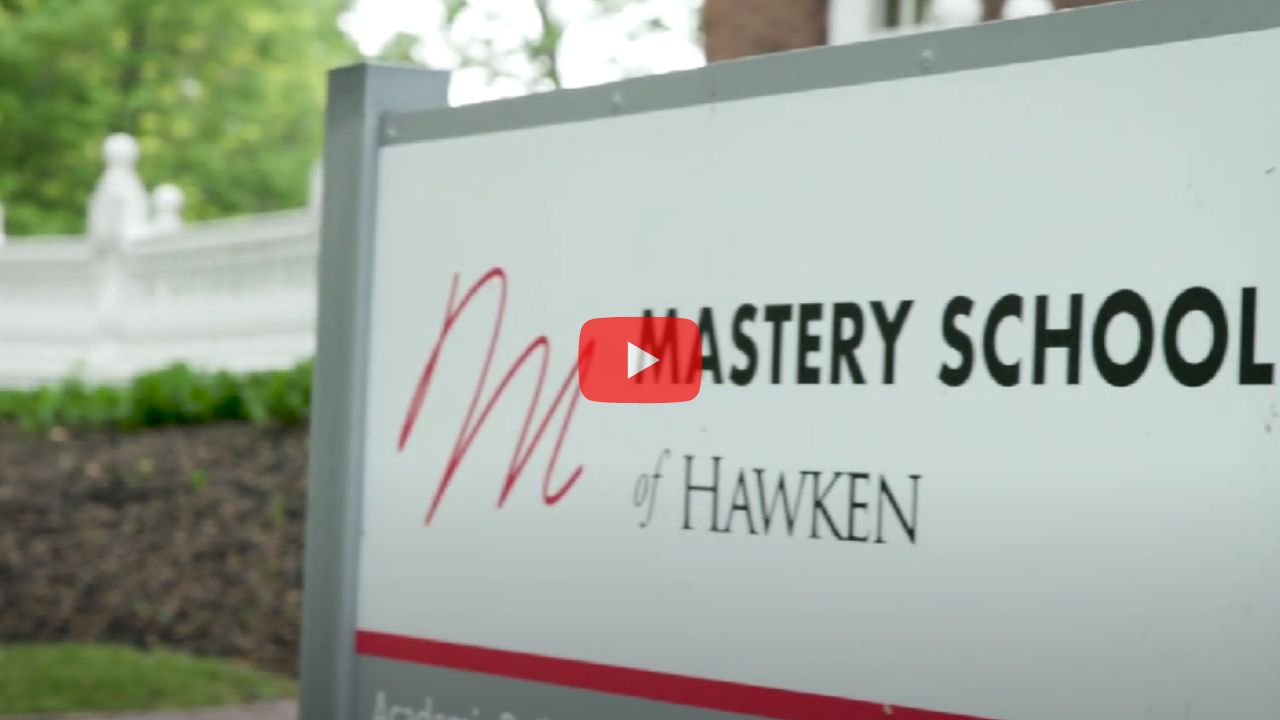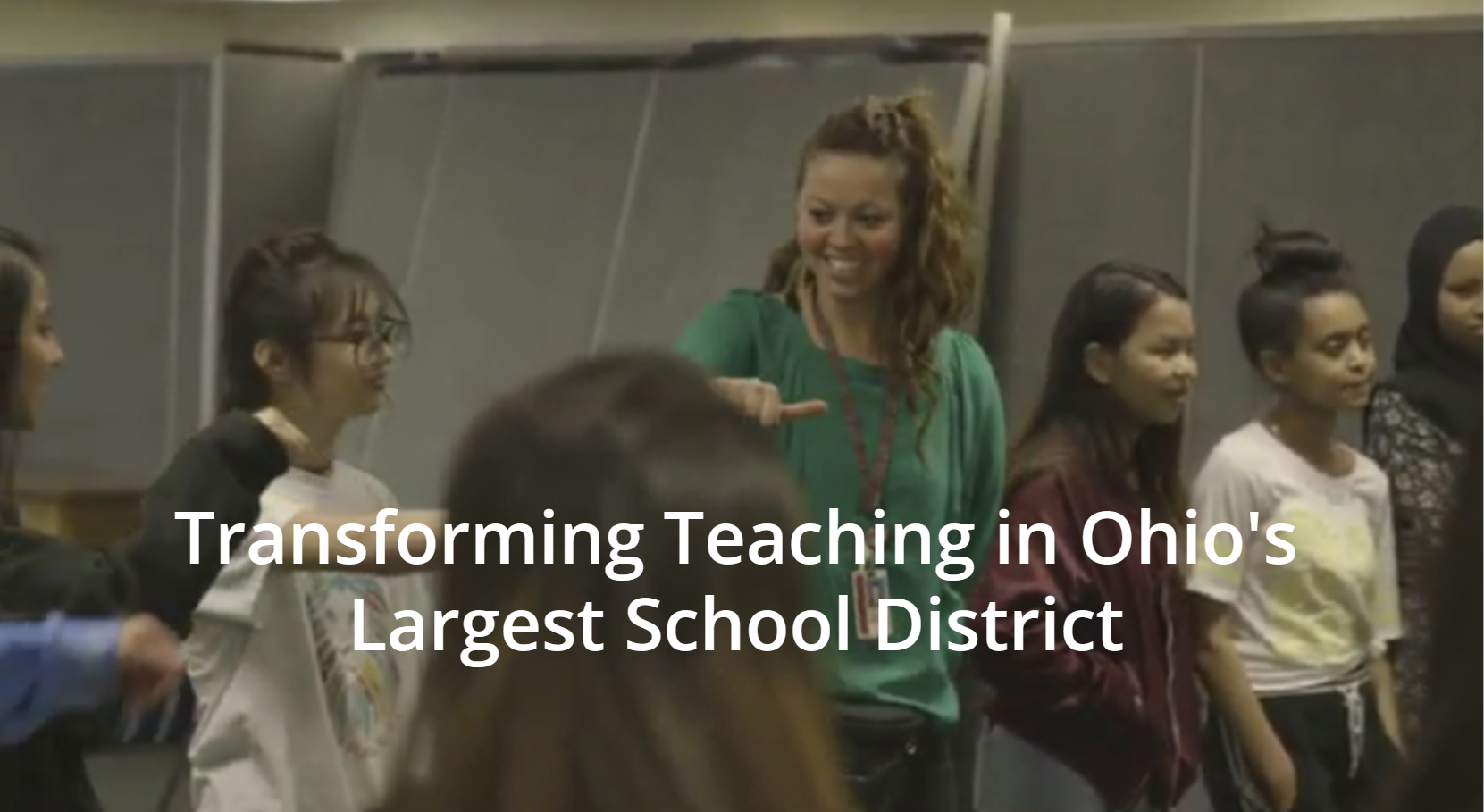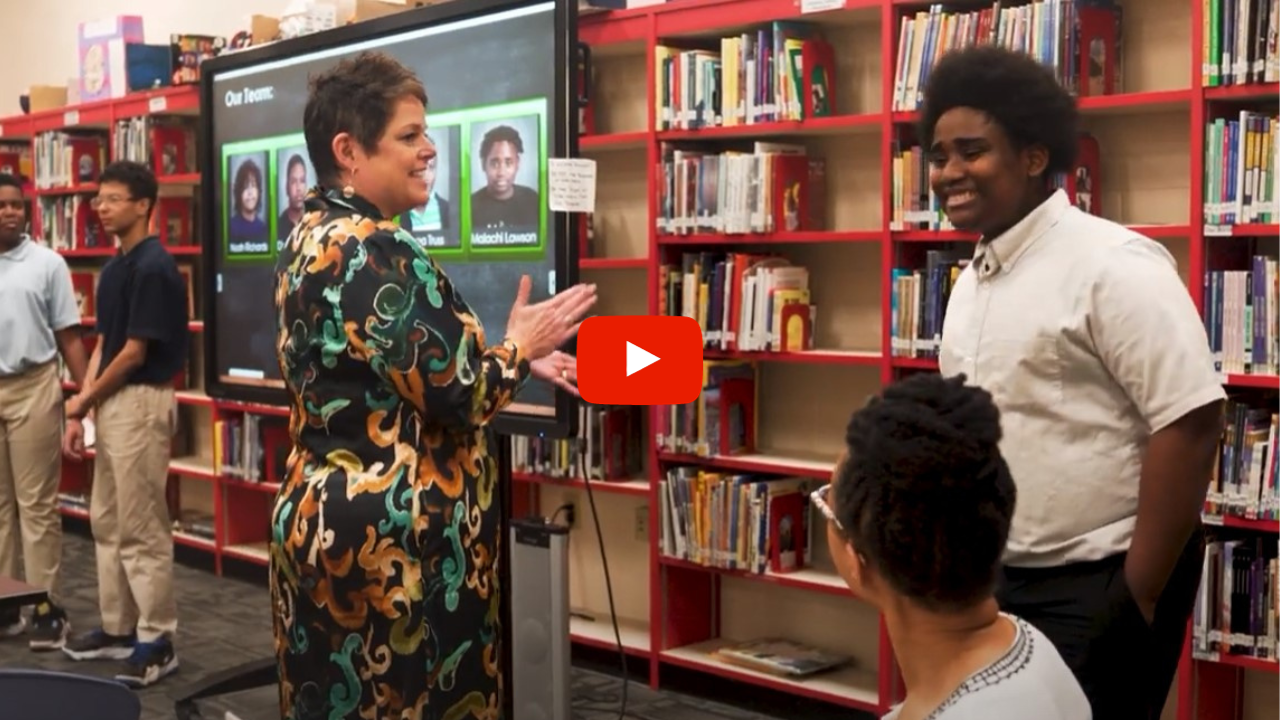In this episode, Doris speaks with Paul Chiment and Blake Dorfman of Laguna Blanca School in Santa Barbara, California. Paul is a veteran high school Math and Economics teacher and Blake an early career middle school English and Digital Art teacher who created an innovative Entrepreneurship program. Learn how their journey to teach entrepreneurship led to deeper student learning, changed teaching methods and workshops for other educators.
Do School Better: A Podcast for People Who Want to Transform Education - Listen to more episodes here
Doris: Hello, Paul and Blake.
Blake: Hello.
Paul: Hi.
Doris: What an extraordinary workshop we just finished together. It was really inspiring. I’d like to start. You’ve built this extraordinary program, the two of you, at Laguna Blanca, and if I have you start by talking about the program as it is now, I think we’re going to intimidate everybody. And instead, I think it’d be helpful if you started by talking about why you came to that very first workshop that you guys attended, and then what you did coming out of it. And then we’ll talk about how you went from there over the last two years to get to the extraordinary program you have now. So, Paul, maybe you could start by talking about where you were when you came into the workshop and what you did with what you got out of it. And then, Blake, I’ll ask you to do the same.
Paul: Yeah, well, it’s been an incredible journey over the last two years. So, I guess it was summer of 2015, I’ve been teaching advanced high school math and AP statistics and AP economics for many years, and I was really questioning what I was doing for the students. My idea of success for the kids was, you know, a four or five on the AP exam, and maybe, if they were very prepared for their next math class. But it was actually the students that came to me and said, “You know, we’d really prefer to have something more real world.” So, I started investigating this, and I saw that you were doing some incredible work in Cleveland, and you had this workshop, and I attended. And it just blossomed from there. It’s only been two years, but it seems like it’s been 20 years in how we just started with a pilot, a single class in entrepreneurship, where I really didn’t know what I was doing at first, and it’s blossomed. I’m just so excited about it.
Doris: That’s wonderful. And what about you, Blake? Where were you coming into that workshop, and what came out of that?
Blake: Well, I think Paul was definitely the leader on all of this. This was something that he pushed for as a nearly quarter-century teacher at our school and really sold it. And then I was lucky enough to be thought of as, “Okay, this is someone who could do it in the middle school.” And going into it, I had prepared some background materials, but I really, as a much newer teacher than Paul, I was really in the mindset of, “I need to know exactly what I’m supposed to do, exactly what I need, and what exactly am I doing on the first day and the fifth day and the 12th day of class next year.” So, that workshop, I actually came in very nervous and apprehensive in that workshop because I didn’t know what I was going to be doing the next year. So, that’s really where I started on day one at that workshop.
Doris: So, you, as Paul mentioned, he’s been teaching Math courses and economics courses, when you came into the workshop, you had been teaching what?
Blake: So, my first two years at our school, I was actually in charge of our newly renovated library. I had my teaching credential in English, but that year, I just finished my first year of teaching seventh grade English, and it was a great year, and I just finished my first year of teaching our yearbook class. So, I was pretty new and green, as far as the classroom. I had done my credential program, but I was coming off of, you know, you’d said in that workshop, you need three years to make a class your own. Well, I had just done my first year of seventh grade English and my first year of yearbook. So, I was still making those my own, and I actually, heading into the next year, I had English, I had yearbook, and then I was taking on another new class in digital arts and then doing our entrepreneurship class. So, I was really nervous because I was probably in a little over my head. And with Paul’s ambition and drive towards this, I wanted to make sure that it was perfect, but what I’ve learned is that, you know, it’s not going to be perfect. But getting this kind of philosophy into a classroom is really, it’s not perfect at the start, and it’s never gonna be perfect, but it really can have an impact right away however you are able to introduce it.
Doris: And I wanna point out that with Paul driving all of this, two years later, you’re still on speaking terms with him. So, that’s pretty… I’m very impressed with that.
Blake: Yeah, and I mean I’m surprised because he taught me algebra 20 years ago, and I wasn’t the best math student. So, he still put his faith in me despite…
Paul: Absolutely, Blake.
Blake: …my struggle with the quadratic formula.
Doris: Nice. Maybe that’s why you’re still on speaking terms because he’s still teaching you all these years later, right?
Blake: Exactly.
Paul: That’s maybe it.
Doris: That’s got to be it. So, you came out of this workshop, the two of you, and both did your pilots, one in high school and one in middle school. And as you take yourself back to what that first year of piloting, what you experienced, what you saw out of that, talk to us about what came out of that first year. And Blake, this time you could start, and then we’ll talk to, we’ll ask Paul the same.
Blake: Yeah. I was focused so much on content in the summer leading up to, in the weeks and the days leading up to the start of my class. I was worried so much about, you know, whether every project was going to be perfect, and that in our case, it’s an entrepreneurship class, was it going to be perfectly suited for, you know, young entrepreneurs. But I think what I realized pretty early on was that there are more basic peripheral skills that are learned or acquired in this class, that even if you have a project in, say, an entrepreneurship related project that maybe falls a little flat, you still have students communicating in ways they haven’t, and you still have students getting out of their comfort zone, where, in traditional schooling, what we’re doing better here is, in traditional schooling, they can sit in the back corner and hide in their notebook and take good notes, and maybe a test or maybe not, but as soon as you entered that room, whether or not the project was perfect, or some aspects just needed to be scrapped, there was, from the start, professionalism and people skills and kids really doing something differently in the room. And so, that was a big comfort to me, a big comfort definitely.
Doris: That’s really interesting. And what about you, Paul, that first year?
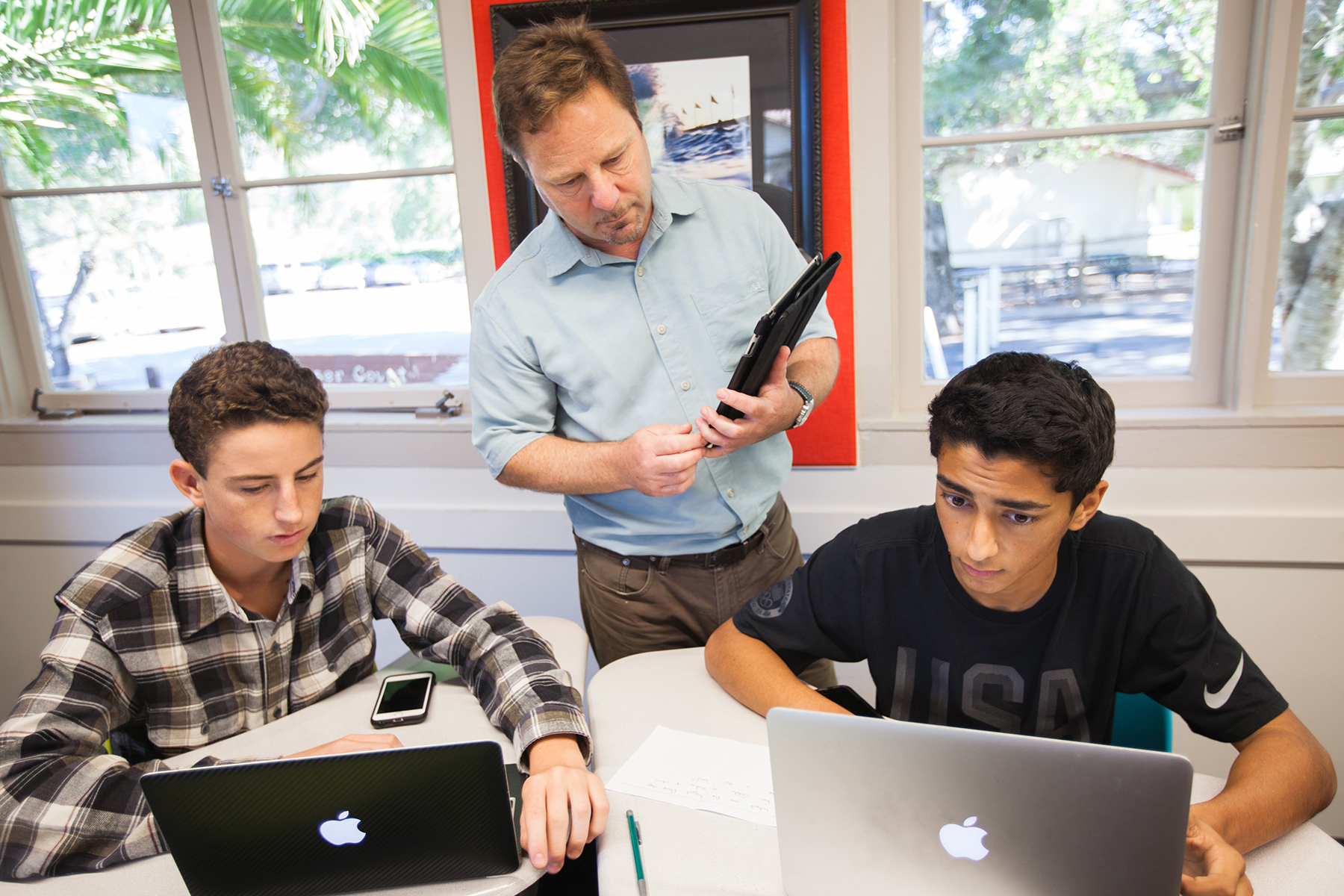
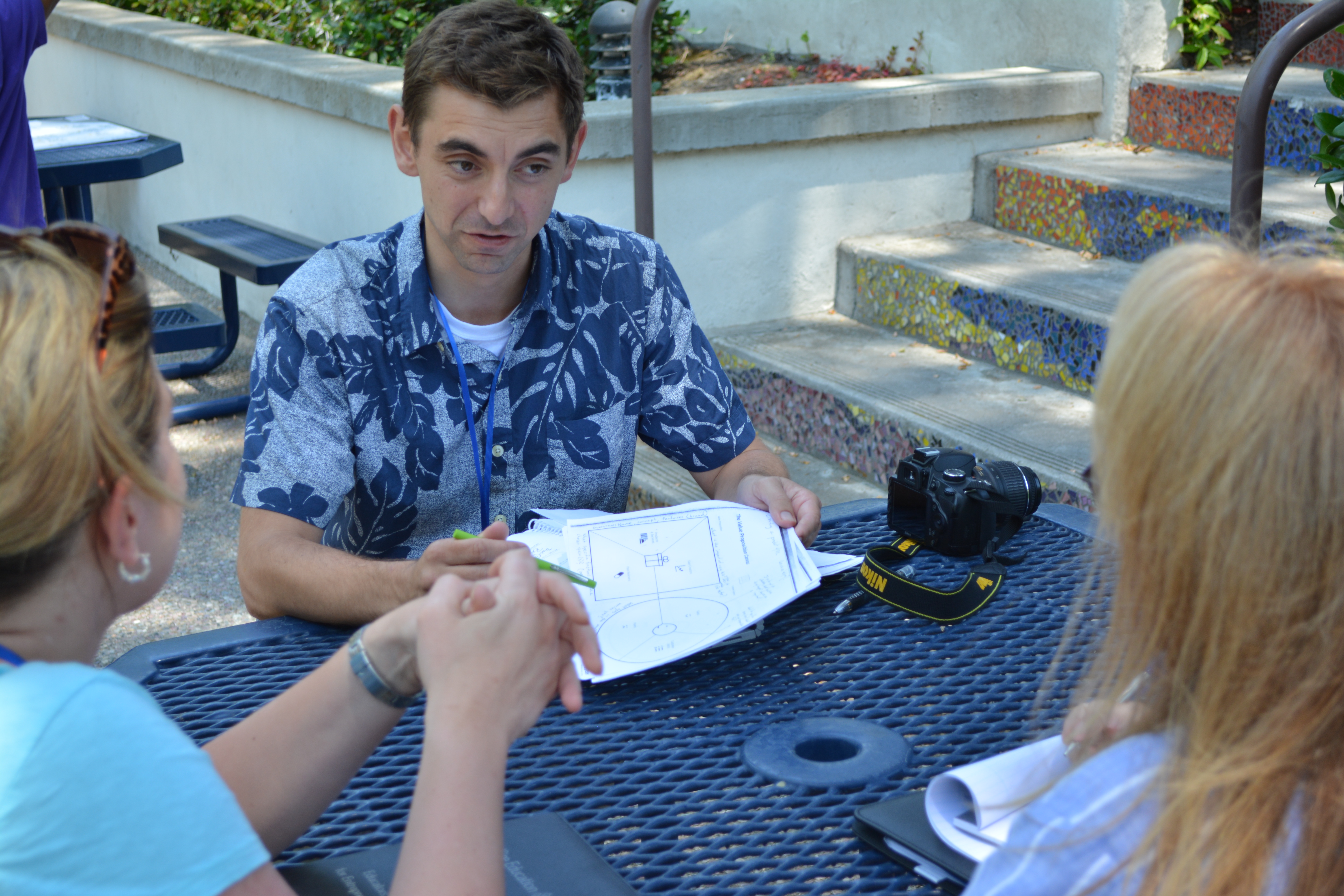
Paul: Yeah, the first year, especially the first few months, I was very nervous because having taught for many years and have taught courses that are very content driven, I am the expert, I am the guy that you go to for the answer, and now I was walking into a classroom where I didn’t have the answer, in fact I didn’t even have really the questions. The workshop at Steve Blank’s house at least gave me some structure. I could build around this and structure it in a certain way so that the problems and the solutions could emerge. So, that really helped. My first project involved J7 Surf shop in Santa Barbara. And so, I know surfing, I’ve been in that shop a million times, so it just made it very comfortable for me to work with some entrepreneurs and then get the students involved and get them problem-solving for that surf shop. And it just went so wonderfully. I don’t know if the solutions they produced were that wonderful, I don’t know if my teaching was that wonderful, but the experience was wonderful. And I was just so excited to see it happen and see it work. I went on to do one with H4O, which is Hands4Others, and that is a nonprofit that gets students to raise money so that they can build water treatment facilities all over the world for villages that need water treatment. So, the kids learn so many different things about business and about the world, and that’s what was hard for me is that I was no longer in control of the content. The content came from the real world, it came from the entrepreneur, and I had to be more of a coach than a teacher.
Doris: Yeah, but it’s, you know, I say this often, the reason that I think it’s so important that we give you guys the structures and the methods to use to start out is that I actually think this is very much teaching, it’s just a different kind of teaching. And sometimes, the words that we use in this industry, like you know, guide on the side or coach, people have certain baggage they associate with that, and the biggest one is, “Oh, this isn’t rigorous, and it’s not really academic.” And I think it’s entirely different. I think we’re redefining what academics is and what learning looks like.
Paul: Well, what I see is, as old school academics, when I look at what teaching has been, teaching, if you see it as a way to get students ready for the next level, when you look at high school education and university education, it’s almost as if we’re trying to produce university professors. Teachers teach as if the job of the future is to be a university professor and success is to get them their students closer to be a professor at whatever subject they’re teaching. And so that, when I see academics in that light, I worry that we’re actually doing tremendous harm to these kids because maybe only 1% will be university professors, the other 99%, we say, “Well, sorry, you don’t remember your algebra anymore,” or, “Sorry, you cannot write this kind of thesis,” but most of our students in public and private schools don’t need that.
Blake: I think the paradigm shift, if you will, the difference between this and the traditional methods that Paul was talking about is, “Who are the students trying to please?” In my English 7 class, they are trying to please me as their teacher so that they receive good feedback and a good grade, which will please their parents, and ultimately, they’re working towards college, perhaps at the upper school level. But when you, and this is, you know, kind of a buzzword, but when you have a real world aspect to it, you are trying to please someone outside of teacher and parent, you are trying to solve a problem, or you’re interacting, you’re putting yourself on the line for someone outside of that teacher and parent triangle that you have with them. So, I think that that’s really a big difference.
Paul: That’s something I really make a point with my students is I have a very different type of relationship to my students when we’re doing entrepreneurial activities than when I’m in a traditional algebra or pre-calculus course. In those courses, like Blake said, in many ways, they’re trying to please me because I am the god of points. I mean I could create a quiz worth eight points, and then I’ll say, “No, it’s worth 10 points,” and then, where did those two points come from? I just pulled them from the universe, I am the god of points, and that’s understood in the traditional academic fields. But my relationship with the kids is very different in this sense because most of their grade doesn’t come from me, it comes from how well they present themselves and come up with creative and innovative solutions for the entrepreneurs. And so, when I say I’m a coach, I’m very much a teacher, but the traditional word “teacher” is kind of the god of points, you try to please me, and that, it’s a very different relationship in this type of class.
Doris: Yeah, because you’re teaching them not what to think but how to think.
Paul: Exactly.
Doris: It’s still teaching, but you’re teaching something different.
Paul: Right. I see a parallel here with parenting. We see tremendous amounts of overparenting now, helicopter parenting, the notion that more is better when it comes to being a parent, and I see that in teaching as well, where we tend to overteach. If they didn’t get it, we’ll just give them more of the same thing instead of stepping back and letting them learn self-reliance, letting them learn how to learn and how to solve problems on their own. And this is the perfect vehicle for that.
Blake: I think…
Doris: Yeah, it’s not about what you teach, it’s about what they learn, right?
Paul: What they learn, right, exactly.
Blake: And I know the doors, a lot of, you know, a lot of listeners might not have an entrepreneurship class like we do. So, they’re implementing this in a science class or whatever. I see this, I saw it bleed over into my digital arts class, believe it or not, which is just an elective where we’re introducing kids to Photoshop and Adobe Illustrator and Adobe InDesign. And as I was teaching entrepreneurship at the same time and thinking about what I learned at the workshop, I took the problem-solving mentality and the self-reliance, and I put it into that class because my initial thought was, “Okay, I have 20 kids, all on computers, trying to produce something on Adobe Photoshop,” in an art setting. And it was difficult, and I would make it difficult. They would raise their hands, and I would run and help them put out that fire and show them what they need to do on the next step.
But as I taught entrepreneurship, at the same time, I realized that most of these kids, hopefully a good amount, will use Photoshop in their future, but the most important thing is for them to get frustrated to run into an issue. And when they raise their hand, I say, “First, what can you do to figure this out on your own? Who can you reach out to besides me, the savior, who’s going to come and solve the problem for you and show you exactly what to do and show you exactly how to finish that math problem? Instead, you need to be resourceful and figure out either a way around it or figure out a way to address the problem.” So, that self-reliance is more important than anything, I think, in this age of…especially if you’re dealing with overparenting, right? I love the figure it out.
Doris: Yeah, that’s great.
Blake: FIO, figure it out, is a great term I think.
Doris: Figure it out. And we all know what the difference in our own lives, no matter how old you are, between things that were given to you and told to you by someone else and things we struggled with ourselves to produce. So, this year, we just finished a workshop together. You went from coming into a workshop two years ago, in your case, Paul, driving the train, and Blake, you’re coming along a little nervous, to two years later saying, “Hey, we want to do a workshop here at Laguna Blanca. Now you’ve been developing your programs at this school for two years, they’re phenomenal. Where are you, starting…let’s start, Paul, with you, and then Blake, where are you now? Why did you do a workshop? What do you think about all of this?
Paul: Well, I was just excited. I had gone to the workshop in 2015, I had spoken at the workshop in 2016, and I know, I’m just the type of person who like to challenge myself, and I thought, you know, I would love for people to come here and see what we’re doing and see our campus and get excited about something that can really make a change in these kids’ lives. So, that’s where I was coming from.
Doris: What about you, Blake?
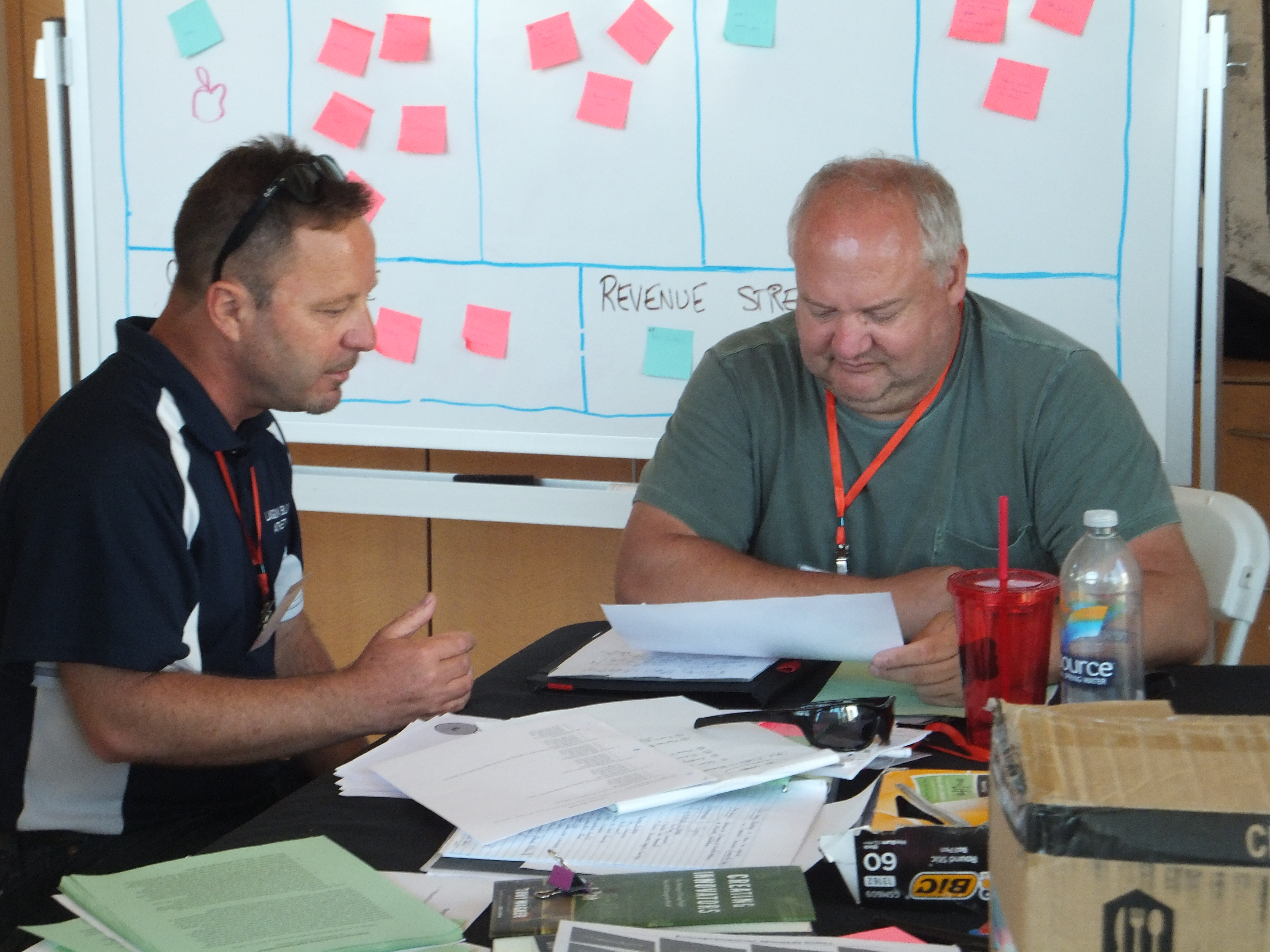
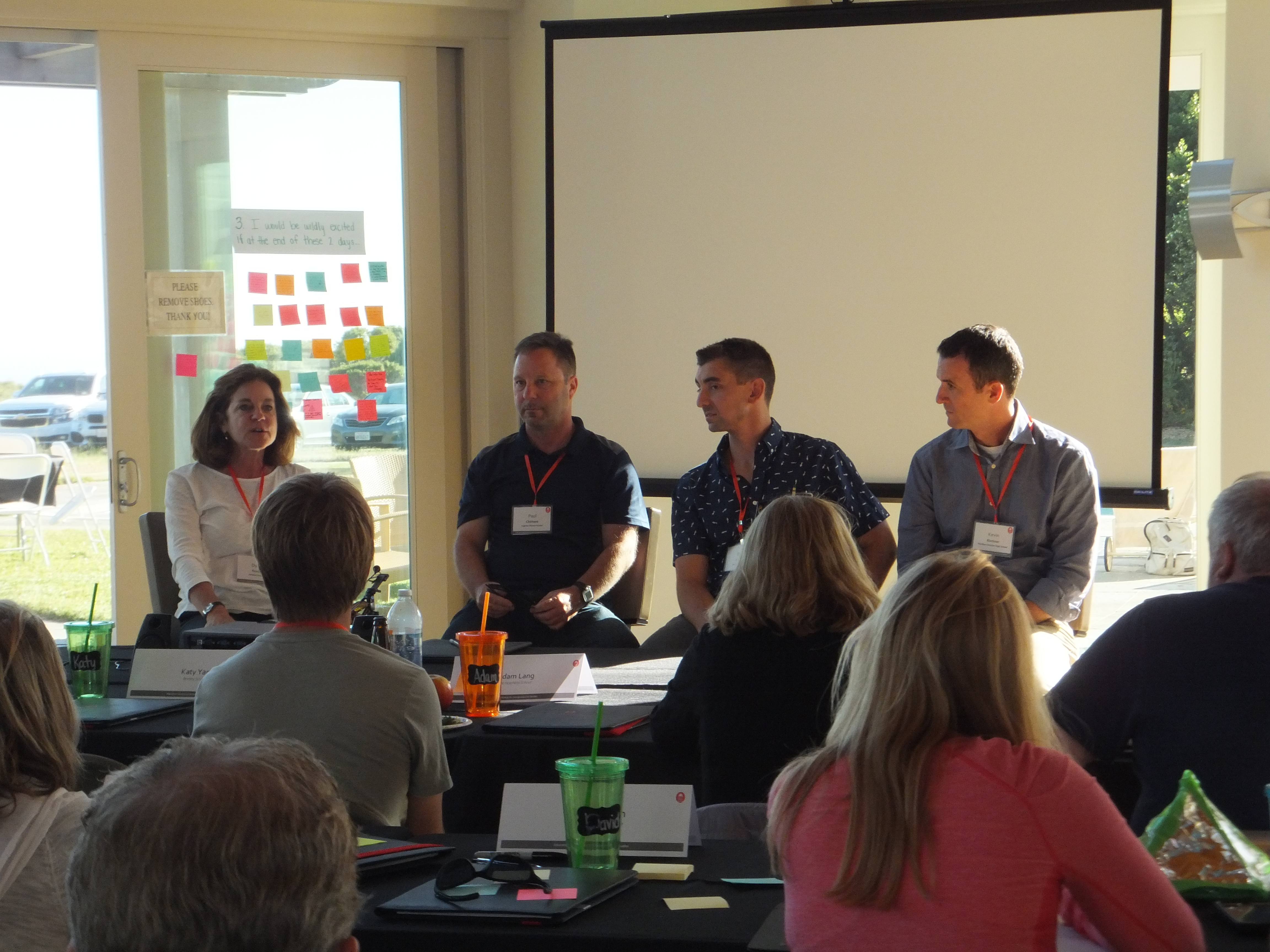
Blake: I think the same. I share the excitement, and thinking about the setting up in northern California, at Steve’s house the last two years, how beautiful that is, I thought that our campus was a great setting for that, and I also felt like I had something to offer. With that said, I felt extremely, it was tough for me to act like an expert after two years. I was getting all these questions in the one-on-one sessions, kind of coaching sessions about, “Well, how should I do this, and how should I do that?” And for me, having taught four semesters of this, it was really hard to… You know, it’s still always a work in progress, and I said, “I’m not, I’m no expert in this. I’m not Doris.” But I think that…
Doris: No, it’s for everybody, right? It’s a work in progress.
Blake: Right, and I think that just after two years, just even after one year, I could have, speaking at Steve’s last summer, I felt like I had something to offer because I was in these shoes of these people who are starting a pilot two years ago. And even doing it for one year is enough to share your experiences and make it meaningful.
Paul: And I just like to add that it made me more authentic to myself actually because I’m not an entrepreneur. I’ve been a teacher for many years, but I see myself more as an intrapreneur within the school system trying to promote change. And I see my class and this program at our school as my way of effecting change and making a difference within the school. So, I needed to do something, I can’t just tell my students, “Hey, go out there, take chances, don’t fear failure, take risks.” I’m not an authentic educator unless I’m actually doing that myself, and I’m not in the position right now to go start my own business, but I could do something within the school that gives me a similar experience that I’m giving to the students.
Doris: Well, you were both incredibly expert at what you gave…in what you gave to the people who came to the workshop because as a many-many-year teacher who comes into this and says, and, Paul, honestly, you’re a rare kind of teacher who’s been teaching in traditional classes for decades and says, “Yeah, I’m going to put myself in a uncomfortable zone and try something radically different,” and does it with a kind of energy and open-mindedness and smarts that you did. And Blake, for you, as a brand new teacher, to say, “Okay, I’m not even yet comfortable in my skin as a day-to-day regular teacher, and I’m going to put myself way out there.” We talk so much about the need to be innovative and to do things creatively and to change. And it’s one thing to talk about it, and it’s an entirely different thing to do it. It’s really uncomfortable. And as teachers and educators, we’re used to asking our students constantly to put themselves in uncomfortable places, but we rarely do it ourselves. And the way that the two of you not only dove in, but have absolutely embraced the challenge and ambiguity and risk of being creative, innovative designers of completely different forms of teaching and learning, I’m blown away by both of you, and I think you’re a real inspiration.
And I’d like to ask one other thing for both of you, and that is, because you just did these workshops, and you spent so much energy giving to these teachers from other schools and educators from other schools, as somebody who’s, you’re giving your life’s work to kids and to education, how does all of this relate to your purpose as a person, as an individual, when you think about, “Okay, I’m gonna be a teacher?” How does all of this work you’ve done over the last couple years affect your thinking about your purpose?
Blake: We’re getting existential here, Doris. This is…
Doris: Yes, we are. I’m sorry, I can’t help it.
Blake: Well, when, you know, to zoom out, I think that educators, and that’s the vast majority of people listening to this podcast, we’re obviously not in it for the paycheck, you know. You don’t get rich doing what we do, but you want to… It’s being a person of service. And I know for me, I sort of have these existential moments where I’m like, “Okay, what is my life gonna be about here?” You know, and having family is one thing, but also, we want to…I think it’s important to have an impact on as many lives as possible, and then that branches out exponentially, right? So, if I have, you know, by the time I’m done, 800 kids coming through my classroom in the first decade, and I haven’t done the math on that, if I can have an impact on a good amount of them and steer them towards success, you know, then they’d do something important, and it keeps growing outwards and outwards. And that’s how we make our one life significant. What I really like about, you know, leading this workshop is I hope that maybe one or two of the educators, who I was able to share my experience with, is able to go and start a pilot program, and my counsel or experience then positively affects the program they set up, that positively affects the kids they’re working with in their part of the world, and it grows out exponentially from there. So, we’re trying to… It’s really nice to give kids, to go back to my students, a life skill and say, “I’m not just making them better at whatever is in the textbook, I’m making them better communicators, better teammates, better critical thinkers, better problem-solvers.” That impact becomes greater in my opinion. So, that really, I mean, it helps give me meaning, the more I can influence students in the short time I have them in my class.
Doris: That’s beautiful, and I have no doubt that you have had that impact on more than two of the people who came to that workshop because I watched it. What about you, Paul?
Paul: When I look back on my career, I’ve had now 30 years in the classroom, and I think my purpose has evolved. In my first couple of years as a teacher, I think really what I wanted was probably just to get through the textbook and be liked, and that got me through the first two years. As I evolved, I’ve taught middle school and high school classes. I went through a phase where I wanted to be the expert in mathematics education. I was the go-to person, whether it was curriculum, whether it was methods. Whatever a student or teacher or parent or administrator needed to know, I was there for them with the right answer. As I’ve gotten into 20 plus years of teaching, it’s evolving again where I want to help students be better adults. I want them to have a meaningful life. I think part of it was having a son and sending him off to college a few years ago, and he had a wonderful, very academic education, and he’s doing well in college. But am I having an impact on the actual lives of these kids, or am I just helping them find solutions to math problems? And I think over the years, I have had an impact on the lives of these kids, but I needed another way to do it that transcended simply being able to find solutions or solve word problems or be confident about things. I needed a deeper purpose. And in my opinion, working with entrepreneurship as a vehicle for that, really helping kids become adults, helping them be confident when working with other adults, help them even just simple things like planning and organizing, professional communication, but probably the biggest one is helping them understand that finding the problem is the problem. When they get out in the adult world, people aren’t going to hand them worksheets, and then they’re gonna turn them in and see how well they did. They need to actually be proactive in finding problems, developing solutions, testing those solutions, and seeing if that “solution” actually solved anything. So, it’s a little bit of a scientific method, but it’s a lot more just being an effective adult, whether it’s on the job, or in a family, whatever, that’s what I want the kids to come away with.
Doris: Well, Laguna Blanca is incredibly, incredibly blessed to have the two of you building the program, the culture, the teaching, and we are very, very lucky to partner with you. I can’t thank you enough for what I know is going to inspire people all over the world. Thank you.
Paul: Thank you.
Blake: Thanks, it was a pleasure.


